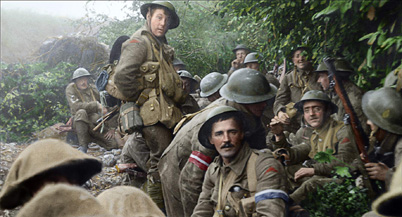Movie Review: They Shall Not Grow Old
By Steven Slater
January 16, 2019
BoxOfficeProphets.com

The film is presented by Jackson, with a short message at the front, and a longer video at the end. I hope it is always shown with these bookends, as they offer extra depth as to why this film was made the way it was, beyond being the centenary of the war’s end. Although it is a bit odd to see Jackson, a barefoot Kiwi, who we know most for his fantasy films, showing his typical hearty exuberance for a documentary about such a sobering conflict, his passion is truly sincere. Not only were his relatives in the war, not all unscathed, but he also has been fascinated with this slightly forgotten war since childhood, collecting magazines, uniforms and even actual artillery pieces from the conflict. It actually seems that Jackson was the perfect person to bring this conflict to contemporary audiences, given his mixture of enthusiasm and reverence, as well as access to all this material he happened to have, and a large post-production facility that is world renowned. All of this ensures that Jackson treats the material as respectfully as he did Tolkien’s works, so that he really does strive as honestly as possible to put us in the moment when the footage was filmed. While the effort is not perfect, given the source material, the effects do gradually fall into the background, and you just see the war.
The film looks at World War I from the average citizen’s point of view. Rather than exhaustively see every aspect of a global conflict with the many nations involved, Jackson chooses to stay with the British, following the voices of real soldiers who narrate what happened before, during and after the war. We start with the state of Britain and its peoples, how they were quickly whipped into shape once war was declared, and then what their life was like for the years that they were often stuck in trenches in France. The footage is entirely from the period, combined with a few magazine or poster images that are also from that era. The voices are all real soldiers, recorded decades ago by the BBC. In the ending video, Jackson mentions there were about one hundred hours of film and six hundred hours of audio, from which this two hour documentary was made. Augmenting the feature are sound effects and voices that are meant to be diegetic, that is they come from what is shown on screen. Great pains were taken to ensure the words you hear were actually spoken, and that the sound effects are authentic.
As beautifully realized as the film is, the actually experience, in my opinion, cannot quite fulfill the promise of the material. Perhaps two hours is simply too short, but the lasting impact of the war still seems a bit distant by the end. The sound actually does the best job, as the constant artillery shells instill some of their fury into your bones. But there are few scenes of combat, as it was nearly impossible to film those, and most of the time in the documentary is spent among the soldiers. In that regard, this movie is not really a documentary about the war, but about those who were in the war, in this case the average British citizen. The title, therefore, makes some sense, as the film presents human beings who are all long dead, but their experience and life stories are still very relevant for the foreseeable future. Quite impactful are the moments we are shown groups of men who are sure to die but minutes after their faces are captured on celluloid. Whether in silent, shaky black and white, or as a 3D color showpiece, it is well worth it for everyone to revisit this era and those who lived in it, and Peter Jackson’s film is in some ways a masterpiece for what is is able to accomplish. It is certainly the most personally important film he has ever made.
Slatergrade: A